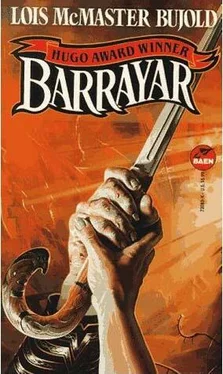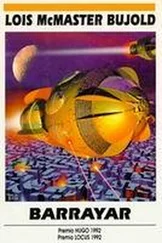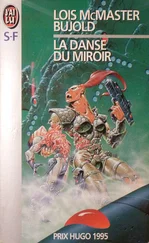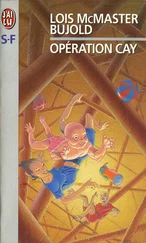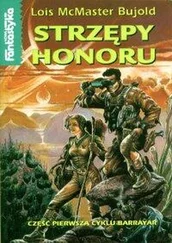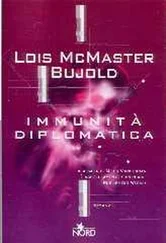Lois Bujold - Barrayar
Здесь есть возможность читать онлайн «Lois Bujold - Barrayar» весь текст электронной книги совершенно бесплатно (целиком полную версию без сокращений). В некоторых случаях можно слушать аудио, скачать через торрент в формате fb2 и присутствует краткое содержание. Жанр: Фантастика и фэнтези, на английском языке. Описание произведения, (предисловие) а так же отзывы посетителей доступны на портале библиотеки ЛибКат.
- Название:Barrayar
- Автор:
- Жанр:
- Год:неизвестен
- ISBN:нет данных
- Рейтинг книги:4 / 5. Голосов: 1
-
Избранное:Добавить в избранное
- Отзывы:
-
Ваша оценка:
- 80
- 1
- 2
- 3
- 4
- 5
Barrayar: краткое содержание, описание и аннотация
Предлагаем к чтению аннотацию, описание, краткое содержание или предисловие (зависит от того, что написал сам автор книги «Barrayar»). Если вы не нашли необходимую информацию о книге — напишите в комментариях, мы постараемся отыскать её.
Barrayar — читать онлайн бесплатно полную книгу (весь текст) целиком
Ниже представлен текст книги, разбитый по страницам. Система сохранения места последней прочитанной страницы, позволяет с удобством читать онлайн бесплатно книгу «Barrayar», без необходимости каждый раз заново искать на чём Вы остановились. Поставьте закладку, и сможете в любой момент перейти на страницу, на которой закончили чтение.
Интервал:
Закладка:
“Sh. Sh. If only I had … not taken the job. Kept you at Vorkosigan Surleau. Pardoned that murderous idiot Carl, for God’s sake. If only we’d slept in separate rooms …”
“No!” Her hand tightened on his knee. “And I refuse to go live in some bomb shelter for the next fifteen years. Aral, this place has to change. This is unbearable.” If only I had never come here.
If only. If only. If only.
The operating room seemed clean and bright, if not so copiously equipped as galactic standard. Cordelia, wafting on her float pallet, turned her head sideways to take in as much detail as she could. Lights, monitors, an operating table with a catch-basin set beneath it, a tech checking a bubbling tank of clear yellow fluid. This was not, she told herself sternly, the point of no return. This was simply the next logical step.
Captain Vaagen and Dr. Henri stood sterile-garbed and waiting, beyond the operating table. Next to them sat the portable uterine replicator, a metal and plastic canister half a meter tall, studded with control panels and access ports. The lights on its sides glowed green and amber. Cleaned, sterilized, its nutrient and oxygen tanks recharged and ready … Cordelia eyed it with profound relief. The primitive Barrayaran back-to-the-apes style gestation was nothing but the utter failure of reason to triumph over emotion. She’d so wanted to please, to fit in, to try to become Barrayaran… . And so my child pays the price. Never again.
Dr. Ritter, the surgeon, was tall and dark-haired, with olive skin and long lean hands. Cordelia had liked his hands the first moment she saw them. Steady. Ritter and a medtech now positioned her over the operating table, and shifted the float pallet out from under her. Dr. Ritter smiled reassuringly. “You’re doing fine.”
Of course I’m fine, we haven’t even started yet, Cordelia thought irritably. Dr. Ritter was palpably nervous, though the tension somehow stopped at his elbows. The surgeon was a friend of Vaagen’s, whom Vaagen had strong-armed into this, after they’d spent a day running through a list of more experienced men who had refused to touch the case.
Vaagen had explained it to Cordelia. “What do you call four big bravos with clubs in a dark alley?”
“What?”
“A Vor lord’s malpractice suit.” He’d chuckled. Vaagen’s sense of humor was acid-black. Cordelia could have hugged him for it. He’d been the only person to crack a joke in her presence in the last three days, possibly the most rational and honest person she’d met since she’d left Beta Colony. She was glad he was here.
They rolled her to her side, and touched her spine with the medical stun. A tingle, and her cold feet felt suddenly warm. Her legs went abruptly inert, like bags of lard.
“Can you feel that?” asked Dr. Ritter.
“Feel what?”
“Good.” He nodded to the tech, and they straightened her out. The tech uncovered her stomach, and turned on the sterilizer-field. The surgeon palpated her, cross-checking the holovid monitors for the infant’s exact position within her.
“Are you sure you wouldn’t rather be asleep through this?” Dr. Ritter asked her for the last time.
“No. I want to watch. This is my first child being born.” Maybe my only child being born.
He smiled wanly. “Brave girl.”
Girl, hell, I’m older than you. Dr. Ritter, she sensed, would rather not be watched. Tough.
Dr. Ritter paused, taking one last glance around as if mentally checklisting the readiness of his tools and people. And will and nerve, Cordelia guessed.
“Come on, Ritter my man, let’s get this over with,” said Vaagen, tapping his fingers impatiently. His tone was a peculiar mix, a little sarcastic prodding lilt over an underlying warmth of genuine encouragement. “My scans show bone sloughing already under way. If the disintegration gets too far advanced, I’ll have no matrix left to build from. Cut now, chew your nails later.”
“Chew your own nails, Vaagen,” said the surgeon genially. “Jog my elbow again and I’ll have my medtech put a speculum down your throat.”
Very old friends, Cordelia gauged. But the surgeon raised his hands, took a breath and a grip on his vibra-scalpel, and sliced her belly open in one perfectly controlled stroke. The medtech followed his motion smoothly with the surgical hand-tractor, clamping blood vessels; scarcely a cat-scratch of blood escaped. Cordelia felt pressure but no pain. Other cuts laid open her uterus.
A placental transfer was vastly more demanding than a straightforward cesarian section. The fragile placenta must be chemically and hormonally persuaded to release from the blood-vessel-enriched uterus, without damaging too many of its multitude of tiny villi, then floated free from the uterine wall in a running bath of highly oxygenated nutrient solution. The replicator sponge then had to be slipped into place between the placenta and the uterine wall, and the placenta’s villi at least partially induced to re-interdigitate on its new matrix, before the whole mess could be lifted from the living body of the mother and placed in the replicator. The more advanced the pregnancy, the more difficult the transfer.
The umbilical cord between placenta and infant was monitored, and extra oxygen injected by hypospray as needed. On Beta Colony, a nifty little device would do this; here, an anxious tech hovered.
The tech began running the clear bright yellow solution-bath into her uterus. It filled her, and ran over, trickling pink-tinged down her sides and into the catch basin. The surgeon was now working, in effect, underwater. No question about it, a placental transfer was a messy operation.
“Sponge,” called the surgeon softly, and Vaagen and Henri trundled the uterine replicator to her side, and strung out the matrix sponge from it on its feed lines. The surgeon fiddled interminably with a tiny hand-tractor, his hands out of Cordelia’s line of sight as she peered down cross-eyed over her chest to her rounded-so-barely-rounded-belly. She shivered. Ritter was sweating.
“Doctor …” A tech pointed to something on a vid monitor.
“Mm,” said Ritter, glancing up, then continuing fiddling. The techs murmured, Vaagen and Henri murmured, calm, professional, reassuring … she was so cold… .
The fluid trickling over the white dam of her skin changed abruptly from pink—tinged to bright, bright red, a splashing flow, much faster than the input feed was emitting.
“Clamp that,” hissed the surgeon.
Cordelia caught just a glimpse, beneath a membrane, of tiny arms, legs, a wet dark head, wriggling on the surgeons gloved hands, no larger than a half-drowned kitten. “Vaagen! Take this thing of yours now if you want it!” snapped Ritter. Vaagen plunged his gloved hands into her belly as dark whorls clouded Cordelias vision, her head aching, exploding in sudden sparkling flashes. The blackness ballooned out, overwhelming her. The last thing she heard was the surgeon’s despairing sibilant voice, “Oh, shit … !”
Her dreams were foggy with pain. The worst part was the choking. She choked and choked, and wept for lack of air. Her throat was full of obstructions, and she clawed at it, until her hands were bound. She dreamed of Vorrutyer’s tortures, then, multiplied and extended into insane complications that went on for hours. A demented Bothari knelt on her chest, and she could get no air at all.
When she finally woke clear-headed, it was like breaking up out of some underground prison-hell into God’s own fight. Her relief was so profound she wept again, a muted whimper and a wetness in her eyes. She could breathe, although it pained her; she was bruised and aching and unable to move. But she could breathe. That was enough.
“Sh. Sh.” A thick warm finger touched her eyelids, wiping away the moisture. “It’s all right.”
Читать дальшеИнтервал:
Закладка:
Похожие книги на «Barrayar»
Представляем Вашему вниманию похожие книги на «Barrayar» списком для выбора. Мы отобрали схожую по названию и смыслу литературу в надежде предоставить читателям больше вариантов отыскать новые, интересные, ещё непрочитанные произведения.
Обсуждение, отзывы о книге «Barrayar» и просто собственные мнения читателей. Оставьте ваши комментарии, напишите, что Вы думаете о произведении, его смысле или главных героях. Укажите что конкретно понравилось, а что нет, и почему Вы так считаете.
